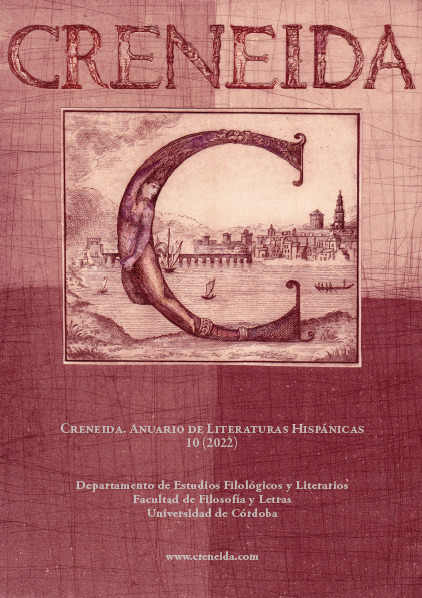Some Observations on the Aquiline Nose: from D’Artagnan to Alatriste and from Physiognomy to Physiognomy
Main Article Content
Abstract
This article focuses on the nose in literature and, specifically, on the aquiline nose as it is outlined in the narrative corpus of Arturo Pérez-Reverte, where its presence is striking, at least in many of his early novels, and in several other European literary works that perhaps served as a model or inspiration for the writer from Cartagena. This is not an exhaustive study, but rather a series of observations on this subject —little or hardly studied at all— that may perhaps give rise to future research. We will also dwell on a possible meaning of this type of nose, that is to say, on a physiognomy that can be derived from this physiognomic trait. It is a discreet but recurrent detail, striking to the attentive reader. It is not a casual element and, therefore, one might ask how it should be interpreted or what it means.
Downloads
Publication Facts
Reviewer profiles N/A
Author statements
- Academic society
- Creneida. Anuario de Literaturas Hispánicas
Article Details
Avisos de derechos de autor propuestos por Creative Commons
1. Política propuesta para revistas que ofrecen acceso abierto
Aquellos autores/as que tengan publicaciones con esta revista, aceptan los términos siguientes:- Los autores/as conservarán sus derechos de autor y garantizarán a la revista el derecho de primera publicación de su obra, el cuál estará simultáneamente sujeto a la Licencia de reconocimiento de Creative Commons que permite a terceros compartir la obra siempre que se indique su autor y su primera publicación esta revista.
- Los autores/as podrán adoptar otros acuerdos de licencia no exclusiva de distribución de la versión de la obra publicada (p. ej.: depositarla en un archivo telemático institucional o publicarla en un volumen monográfico) siempre que se indique la publicación inicial en esta revista.
- Se permite y recomienda a los autores/as difundir su obra a través de Internet (p. ej.: en archivos telemáticos institucionales o en su página web) antes y durante el proceso de envío, lo cual puede producir intercambios interesantes y aumentar las citas de la obra publicada. (Véase El efecto del acceso abierto).
References
Belmonte, José (ed.), Arturo Pérez-Reverte. Los héroes cansados. El demonio. El mundo. La carne, Madrid, Espasa Calpe, 1995.
Belmonte, José, “El eterno conflicto entre la realidad y el deseo”, en Territorio Reverte. Ensayos sobre la obra de Arturo Pérez-Reverte, coords. José Manuel López de Abiada y José Belmonte Serrano, Madrid, Verbum, 2000, pp. 59-74.
Canonica de Rochemonteix, Elvezio, “‘La virtud no es rentable’: el combate a punta desnuda entre dos sistemas de valores en El maestro de esgrima”, en Territorio Reverte. Ensayos sobre la obra de Arturo Pérez-Reverte, coords. José Manuel López de Abiada y Augusta López Bernasocchi, Madrid, Verbum, 2000, pp. 75-88.
Cervantes, Miguel de, Don Quijote de la Mancha, ed. Francisco Rico, Barcelona, RAE / ASALE / Alfaguara, 1980.
—, Novelas ejemplares I, Buenos Aires, Losada, 1942.
Conan Doyle, Arthur, A Study in Scarlet, London, Penguin, 1981.
Conan Doyle, Arthur, The New Annotated Sherlock Holmes. Vol. III. The Novels, ed. Leslie Klinger, New York, W. W. Norton & Company, 2006.
Dumas, Alexandre, Les trois Mousquetaires, ed. Calmann-Lévy (sin fecha).
Eco, Umberto, El nombre de la rosa y Apostillas a “El nombre de la rosa”, trad. Ricardo Pochtar, Barcelona, Lumen, 1988.
Fischer, Pascal, “Die gebogene Nase: Bedeutungszuschreibungen von Matthew Lewis‘ The Monk bis Bram Stokers Dracula”, Arbeiten aus Anglistik und Amerikanistik, XXXVII, 1 (2012), pp. 29-48.
Grohmann, Alexis, Las reglas del juego de Arturo Pérez-Reverte, Murcia, EDITUM, 2019.
Grohmann, “Las mujeres de Arturo Pérez-Reverte”, Monteagudo, 24 (2019), pp. 55-97. DOI: https://doi.org/10.6018/monteagudo.400161
Grohmann, “Las mujeres de Alatriste”, FD Magazine, 25 (2021), pp. 76-83 (artículo también reproducido en Zenda. Autores, libros y compañía: https://www.zendalibros.com/las-mujeres-de-alatriste/).
Pérez-Reverte, Arturo, La tabla de Flandes, Madrid, Alfaguara, 1990.
Pérez-Reverte, Arturo, El club Dumas o La sombra de Richelieu, Madrid, Alfaguara, 1993.
Pérez-Reverte, Arturo, “Héroes cansados”, El Semanal, 25 de abril de 1993, p. 8.
Pérez-Reverte, Arturo, Obra breve 1, Madrid, Alfaguara, 1995.
Pérez-Reverte, Arturo, El maestro de esgrima, Madrid, Alfaguara, 1999.
Pérez-Reverte, Arturo, La Reina del Sur, Madrid, Alfaguara, 2002.
Pérez-Reverte, Arturo, El pintor de batallas, Madrid, Alfaguara, 2006.
Plutarco, Vidas paralelas, VII [En línea]: <https://www.imperivm.org/vidas-paralelas-marco-antonio-por-plutarco/>.
Sanz Villanueva, Santos, “El revertismo y sus alrededores”, en Sobre héroes y libros. La obra narrativa y periodística de Arturo Pérez-Reverte, ed. José Belmonte Serrano y José Manuel López de Abiada, Murcia, Nausícaä, 2003, pp. 401-423.
Stoker, Bram, Dracula, Oxford, Oxford University Press, 2011.
Torres, Rafael, “La irresistible elegancia de la sencillez”, en Arturo Pérez-Reverte. Los héroes cansados. El demonio. El mundo. La carne, ed. José Belmonte Serrano, Madrid, Espasa Calpe, 1995, pp. 288-289.





